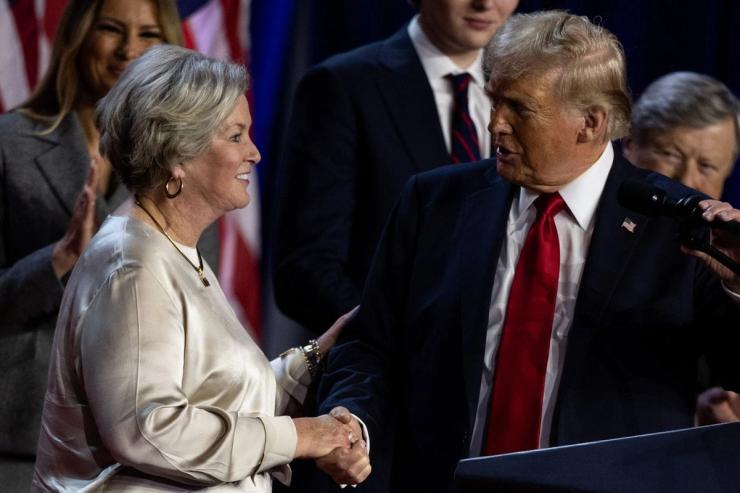The News
Donald Trump appointed Susie Wiles, one of his campaign co-managers, as his chief of staff — the first-ever woman to serve the White House position — amid fevered speculation in Washington over his cabinet picks.
Trump’s transition team is already reviewing names for key posts, the BBC reported, and many who worked with the president-elect the first time round aren’t expected to return.
The news has so far been dominated by those won’t serve: Sen. Tom Cotton, a hawkish conservative seen as a potential defense secretary, has told Trump’s team he does not want an administration post, Axios reported, while Trump’s son-in-law Jared Kushner may advise on Middle East policy but will not join the administration, according to the Financial Times. Chris LaCivita, another campaign manager who worked alongside Wiles, told CBS News he also won’t take a role, and will be “a defender of the team from outside.”
SIGNALS
Choice of Wiles suggests Trump presidency may be more ‘drama-free’
The choice of Susie Wiles indicates Trump’s second term could be “more drama-free” than his first, Semafor’s Shelby Talcott noted. “She’s seen as less ideologically driven than some of Trump’s other confidants, which suggests she’ll be less inclined to steer Trump towards a preferred agenda,” Talcott wrote. Wiles’ hire was approved by Trumpworld, given her experience in managing his unpredictability and for her “willingness to stay in the background,” CNN wrote. But she’s still an “outsider” who has never had a government post, Politico argued, and could be challenged by “one of the most demanding and complex governing staff jobs anywhere.”
Secretary of state pick will be consequential for Europe and Ukraine
The next secretary of state will be critical in shaping the US’ relationship with Europe and NATO, as well as in determining whether Trump will follow through with his desire to pull the plug on military support for Ukraine, Politico wrote. Some of the most likely contenders, former acting Director of National Intelligence Richard Grenell and Sen. Bill Hagerty, are against more aid for Kyiv. Former National Security Adviser Robert O’Brien, who was seen as a more moderate pick that Europe would have likely welcomed, said he will not join the administration. Another contender, Sen. Marco Rubio, may be seen as “too weak” for the position, despite some of his tougher foreign policy views, Politico reported.
Trump may prefer loyal outsiders than sitting lawmakers in his new cabinet
Preliminary lists of potential Trump cabinet and staff showed “mainly white, male, populist and loyal” candidates, Axios reported in July. Trump felt “burned” by disloyal cabinet members in his first administration, some of whom later turned into his vocal critics: “This time, he wants people he can trust both to implement his policies and never block his will,” Axios wrote. To that end, Trump is expected to “place a premium” on selecting businesspeople and political outsiders over sitting lawmakers, NBC News reported: Insiders said Trump saw his first-term outsider picks as more loyal than Congressional members, and he’s wary that picking too many sitting lawmakers for his cabinet would hurt his “ability to get things done in his first 100 days in office.”



